I was about to write a very long post about composting methods, recipes, the hows, the whys, like a how-to guide... but after a few days of contemplation and certainly being affected by the re-listening to a few hours of Carol Sanford interviews on the "Making Permaculture Stronger" (episodes 19, 33 and 55) podcast... I decided to not presume to know more about everyone's context than themselves.
So instead of a technical overview and instruction, you'll get a couple of photos and observation on natural processes - like composting and growing kids.
Our compost is the opposite of ideal, but it's perfect, because it's natural. It has a very uneven mix of materials. Nothing is shredded, everything is whole. It moisture varies widely yet it's never watered. The materials come at an erratic pace. We never add manures to it, or catalysts, or any inputs that have to be bought. A cubic meter of compost - contained between 4 pallets - takes us a spring cleaning of the garden and a whole year of kitchen scraps of 2 families and an autumn garden cleaning as well. So it usually takes about an year and then we top it up with 20-30 cm of straw and let it sit for 6 months at least.
Our compost does not have a rhythm other than its own, it's not one of those "scientific" composts that race the clock, it's never turned, the thermophilic phase is very subdued and poly-phase as well, depending on what we're adding when. We've been told that's not composting, that it's dangerous, anaerobic (untrue, easily proven wrong), does not sterilize seeds and pathogens, etc, etc.
Yet the result is something marvelous. A type of soil that's so light and yet resilient, you can squish it with all your might in your fist and it rebounds and crumbles to the perfect tilth. It's so full of life, so full of surprises, so giving and nurturing, such a good teacher in patience, humility and gratefulness. When used for starting seeds, along with the tomato seeds we planted we also get savory, wild fennel, basil, sulphur cosmos, tagetes, kale, arugula... When added to our high-clay Vertisol, it reduces the rigidity of the soil, it inoculates with an amazing microbiome, its very high organic matter content staying in the soil for years, feeding the soil food web and helping the carbon cycle and the growing plants that will feed us and in turn feed the compost, closing the loop.
Sitting down and typing that made me think how easy is to take a step back and apply that same text, that same meaning to our kids as well.
Our kids are not ideal, but they are perfect, because they are natural. They're very different from one another and different even in themselves depending on the period they're growing through. They are whole. They grow and learn at their own pace. There's no need to rush them along. It takes a long time for them to pass through a development phase and sometimes it seems like nothing's happening. But it is. Deep inside, under the thick mulch, knowledge and love for the natural is cooking, incubating.
Our kids don't have a rhythm other than the one of the family. They're not one of those "trained" kids, their behaviour depending on what knowledge they're ingesting at the moment. We've been told that's a dangerous way to raise kids, hands in the dirt, not sterilized, questioning, proving people wrong.
Yet the outcome is something amazing. Little ones that are so lighthearted and resilient, that even in oppressive situations (looking at you, 2020) they adapt and understand and forgive so fluently. They're so full of life and wonder, so full of surprises and our best teacher in patience, humility and gratefulness. When we leave them to their own devices, we get a garden full with "self"-seeded flowers, herbs and vegetables everywhere. They know the soil is their friend and plaything and also what feeds them, so they respect and tend to it... but they also make their clay bowls and fill them with "stew" of grasses and leaves and flowers and seeds and feather and after the play is done, they deposit them in the compost, knowing things will come full circle.
Here are the promised photos of the sieving process. WARNING: CUTE KIDS ALERT!
After the compost has sat for a few months and is well decomposed and colonised by fungi and bacteria, we remove the leftover straw covering plus the top 10 cm and use that as a starter for the new compost pile. That's usually done in spring when we start to prepare the garden.
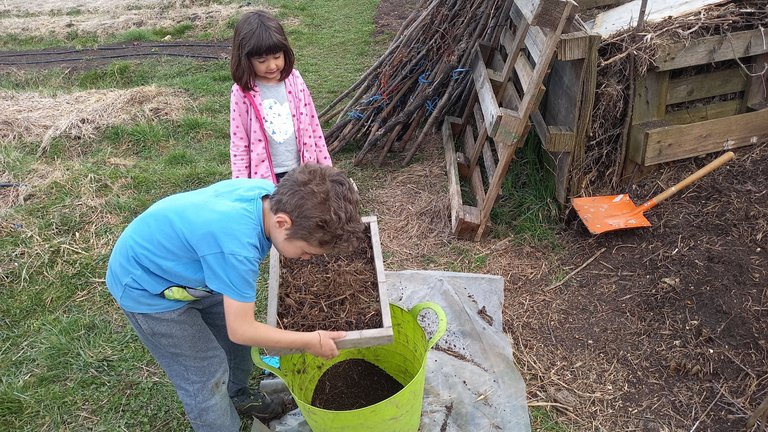
I used scrap materials to make a small sieve for the kids and double the size for me. It's perforated sheet metal, 4 mm holes. The fine particles fall in the bucket or on the tarp, the coarser material and stuff that needs more decomposition time gets used for direct mulching on all fruit bushes. That coarse material is usually integrated in the soil in one year, as now I'm applying new layer of it and hardly see any leftovers from last spring.
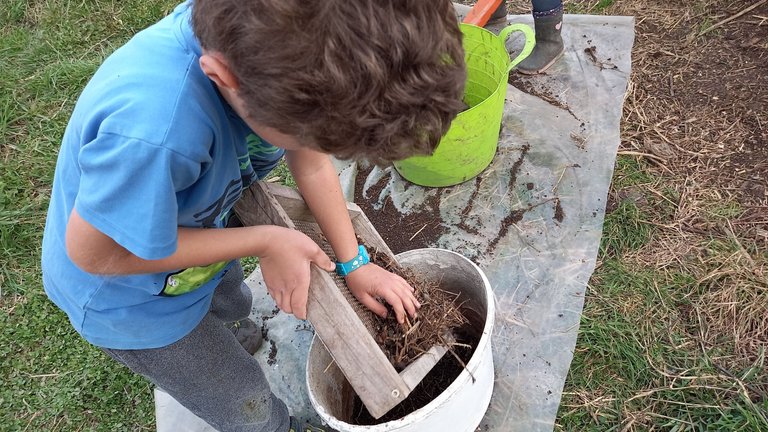
Our big boy can work the sieve properly, but his sister still needs a couple of years to do that so she works with a toy rake to the same effect. She's slower, but more observant and contemplative.
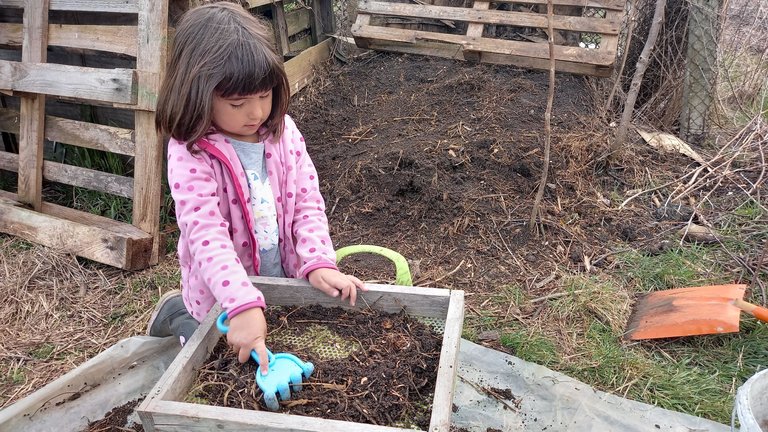
She stops often to pick out a baby worm or a pill bug and talk to them, or to just stick her hands in the compost and hum some song of her own. In the mean time, her big brother is hauling buckets to and fro, mulching, loading the sieve and generally being the big man he imagines he is, while calling the plants by name and reading tags in English.
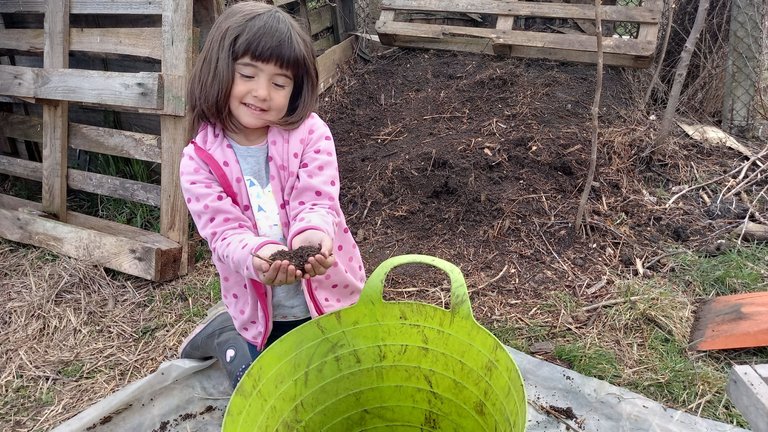
All under the watchful gaze of baby boy, nonchalantly munching on an sunchoke, which I wipe in my sleeve in a futile attempt to remove at least some of the soil from it, knowing full well the moment I turn my back on him to snap a photo, he'll be trying to stuff a handful dirt in his mouth... or a snail shell... or a dandelion...
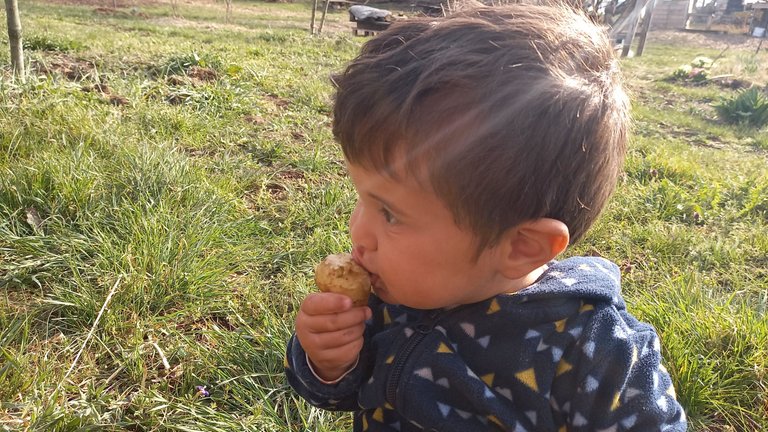
Your compost is like a bigger version of my compost, only I do mine in buckets on my apartment balcony, lol. I'm not very scientific about it, it takes about a year, I don't buy anything for it, but it works. :)
And your kids are probably way better off having their natural childhood (and eating a little dirt)!
!BEER
Yay for compost :) We had vermicompost buckets for a couple of years on an apartment balcony, so yeah, no excuse to NOT compost!
How beautiful! 😍
Scientific compost?! Begone! Safe childhood?! Begone! Excellent analogy.
My mama @buckaroo says your kids are adorable! We like your words "Our kids are not ideal, but they are perfect, because they are natural" She says we are also perfect. She says homesteading is the most natural way to raise children. My baby sister also likes putting everything in her mouth. But we don't have sunchokes. What is it @bodydimitrov?
Helianthus tuberosus! Jerusalem artichoke, also called sunroot, sunchoke, or earth apple.
You are awesome and I have millions of questions about your compost location. Can I leave it with my chickens (trying to add worms in the pile) ? If it's under the sun do I need to water it or should I move it under a shaded location? You're doing great 😊
Thanks :) You can have your compost pile directly in the chicken pen. Take a look at that intro video, but keep in mind that requires much bigger biomass input that a family with a small garden can provide.
https://www.discoverpermaculture.com/FertileCompost
We don't have chickens, but when we do, we plan do make a smaller, modified version of the thing, without all the turning and with lower biomass flow.
Our compost have never been watered, as we regularly add moist material (fresh stuff from the kitchen and garden) and also it rains from time to time and the compost is not covered. For very rainy periods it's nice to be able to throw a tarp on top of the compost to prevent it being over saturated.
Location-wise, I'd say anywhere works. Ours is in mixed shade, has full sun for a few hours in summer and almost no full sun in other seasons. Also, the pallet sides and straw topping basically prevent the sun directly shining on the material.
Let me know if I can be of any further assistance :)
That video is perfect, this is exactly what I was trying to do!
Thanks very much!
This is such a refreshing read! Usually every time I read something on composting there are so many stipulations as to what you should and shouldn't do and I end up feeling like I'm being badly behaved for just letting nature do her thing. Some of my best compost has been from a pile of it I neglected and didn't get back to for ages.
Your description of the kids made me smile too. Especially the end part about your toddler when your back is turned. 🤣
Your post has been featured in the Lotus Garden newsletter, which will be published tomorrow, and you've been selected as this week's beneficiary recipient.
You've been curated by @minismallholding for Natural Medicine's homesteading newsletter, supporting gardeners, permaculturalists, foragers, environmentalists and other earth centred relationships with the earth.
CommunityIIDiscord
Thank you @minismallholding for your kind comment :) That's the exact reason many times me and the wife, we just do things in a way that comes natural. I'd rather do something natural and see if it comes out wrong than don't do it at all out of fear of failing or not doing it "properly".
Love this post, @bobydimitrov ! What an apt comparison. And especially love the last photo....
What a delight this was to read. I love your composting methods, nature doesn't do it by a scientific standard, so why should we?
The analogy with kids is so spot on and teaching them this will ensure that they know the true value of soil and what really sustains us.
Beautifully written.
Congratulations @bobydimitrov! You have completed the following achievement on the Hive blockchain and have been rewarded with new badge(s) :
Your next target is to reach 3250 upvotes.
You can view your badges on your board and compare yourself to others in the Ranking
If you no longer want to receive notifications, reply to this comment with the word
STOPCheck out the last post from @hivebuzz:
View or trade
BEER.Hey @bobydimitrov, here is a little bit of
BEERfrom @phoenixwren for you. Enjoy it!Learn how to earn FREE BEER each day by staking your
BEER.Este es un post muy original, lo felicito, los niños son lindos siempre !